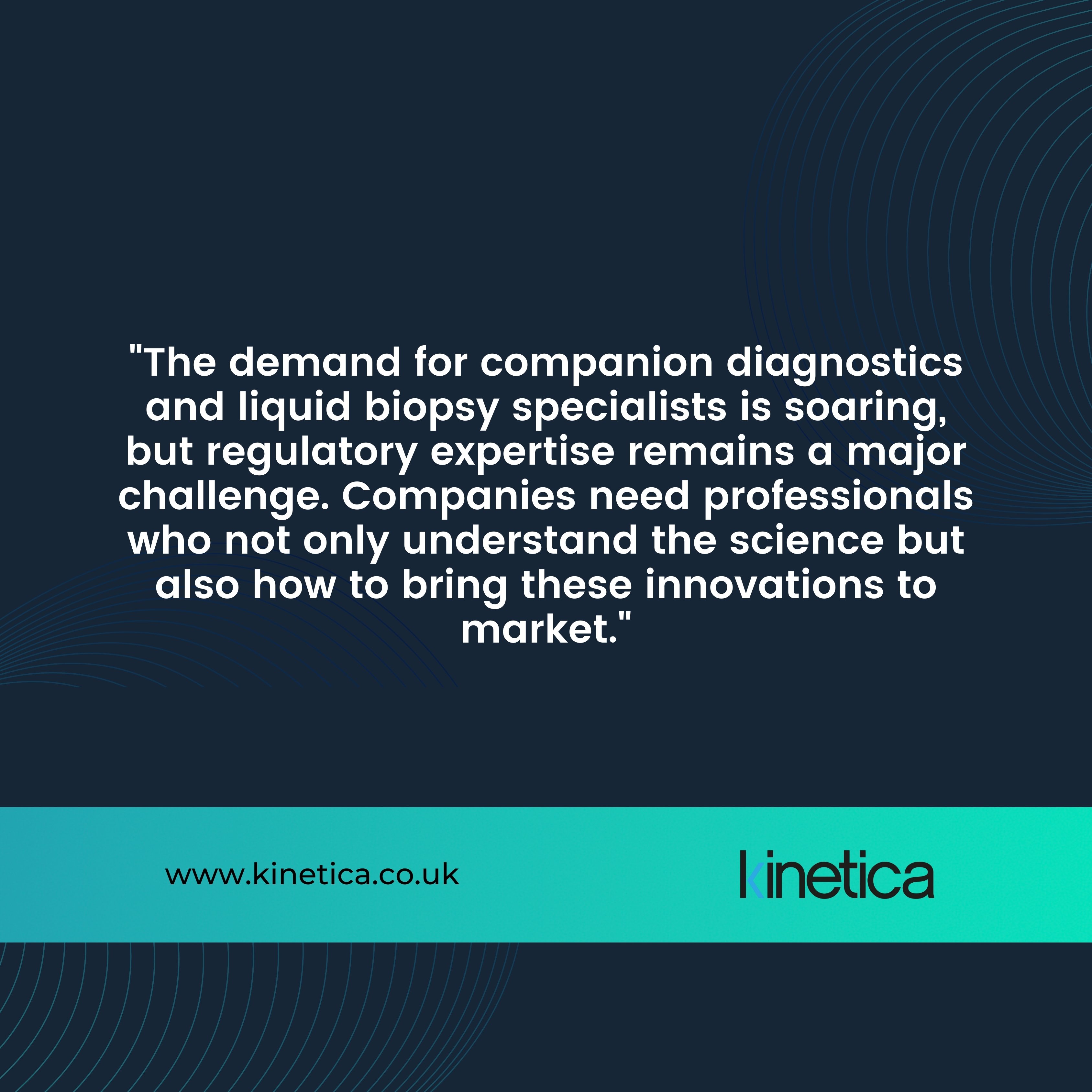
INSIGHTS
The latest insights & news from Kinetica
Advancements in Diagnostics are Transforming Patient Care
05 Mar, 20255 MinutesDiagnostic technologies are undergoing a significant transformation, offering earlier detect...

Diagnostic technologies are undergoing a significant transformation, offering earlier detection, personalised treatments, and improved patient outcomes. In 2025, we are seeing rapid advancements in artificial intelligence, liquid biopsies, and point-of-care testing, all of which are shaping the future of healthcare. These developments are not only improving diagnostic accuracy but also making healthcare more accessible, efficient, and tailored to individual patients.
Artificial Intelligence Enhancing Diagnostic Accuracy
Artificial Intelligence (AI) is becoming an essential tool in modern diagnostics, offering unprecedented accuracy and efficiency across multiple disease areas. A notable breakthrough is Harvard Medical School’s AI model, "Chief," which can detect multiple types of cancer with an accuracy of up to 96%. This system, trained on extensive datasets, has outperformed traditional diagnostic methods by as much as 36%, demonstrating the potential for AI to revolutionise cancer detection.
The rise of AI-powered tools is reflected in the global AI in healthcare market, which was valued at over $9 billion in 2024 and continues to grow. AI is being integrated into digital pathology, radiology, and augmented reality-assisted surgery, significantly improving both diagnostic precision and clinical decision-making. The automation of image analysis, for example, is accelerating turnaround times for identifying diseases, particularly in fields such as oncology and neurology.
Companion Diagnostics Driving Personalised Medicine
As healthcare moves toward a more personalised approach, companion diagnostics (CDx) are playing a vital role in tailoring treatments to individual patients. These tests identify specific biomarkers that help determine which treatments will be most effective, reducing the trial-and-error approach often seen in drug prescription.
The global CDx market, valued at $3.76 billion in 2023, is projected to reach $12.5 billion by 2033, growing at a CAGR of 12.76%. This growth is largely driven by their use in oncology, where CDx is helping match cancer patients with the most effective targeted therapies.
Regulatory bodies are also supporting this shift, with the FDA approving nearly 180 CDx tests, many of which are for cancer treatments. The integration of these diagnostics is helping pharmaceutical companies improve the efficiency of their drug development pipelines, ensuring that patients receive the right medication from the outset.
Liquid Biopsies Revolutionising Cancer Detection
One of the most promising innovations in diagnostics is liquid biopsy technology, which enables the detection of tumour DNA fragments circulating in the bloodstream. Unlike traditional tissue biopsies, which can be invasive and time-consuming, liquid biopsies allow for real-time monitoring of cancer progression and treatment response.
The NHS in England has started using liquid biopsies to identify genetic mutations in breast cancer patients, enabling oncologists to prescribe targeted therapies more efficiently. This breakthrough is expected to reduce the need for surgical biopsies and accelerate treatment decisions.
With ongoing research, liquid biopsies could soon become a routine screening tool for multiple cancer types, allowing for earlier detection and intervention—critical factors in improving survival rates.
Point-of-Care Testing Expanding Accessibility
The expansion of point-of-care testing (POCT) is significantly improving access to diagnostics, particularly in remote and resource-limited areas. With the development of portable diagnostic devices, healthcare professionals can now conduct rapid assessments for infectious diseases, cardiovascular conditions, and chronic illnesses outside of traditional hospital settings.
The integration of AI and digital health tools into POCT is further enhancing diagnostic precision. Wearable biosensors and smart diagnostic kits are now capable of providing real-time health monitoring, enabling earlier intervention and reducing hospital admissions. Innovations such as these are particularly valuable in managing conditions like diabetes and cardiovascular diseases, where continuous monitoring is essential for effective treatment.
Market Growth and Economic Impact
The in vitro diagnostics (IVD) industry is experiencing rapid growth, driven by these technological advancements and the increasing emphasis on personalised medicine. The global IVD market is expected to grow at a significant rate, with the adoption of digital diagnostics, POCT, and liquid biopsy technologies leading the way.
These advancements are making diagnostics faster, more accurate, and more accessible—improving patient outcomes while also reducing costs for healthcare providers. As the demand for high-quality diagnostics increases, companies will need skilled professionals who understand both the technical and regulatory complexities of this fast evolving sector.
At Kinetica, we understand how crucial it is to have the right expertise driving innovation in diagnostic technologies. We specialise in connecting healthcare organisations with professionals who are at the forefront of these advancements—whether in AI-powered imaging, liquid biopsy research, or point-of-care development. Our role is to ensure companies have access to the talent that can help shape the future of diagnostics.
Claire Collinson, Client Relationship Leader & Delivery Solutions Manager at Kinetica, shares her insights:
"With over 18 years in recruitment and a background in science and engineering, I’ve had the privilege of working closely with professionals and organisations driving innovation in diagnostics. The sector has evolved rapidly, with advancements in AI, liquid biopsies, and personalised medicine pushing the boundaries of what’s possible in-patient care.
One of the biggest challenges companies face, is navigating the complex regulations ensuring quality and compliance remain at the forefront. The increasing demand for companion diagnostics, has placed greater emphasis on regulatory expertise, as these technologies require co-development alongside targeted therapies. Additionally, as liquid biopsy adoption grows, organisations need professionals who not only understand the technical aspects of these innovations but also how to bring them to market.
We work closely with clients in the diagnostics space to identify and place highly skilled professionals who can drive progress. We have successfully placed regulatory specialists ensuring a smooth approval processes, R&D experts developing the next-generation diagnostic tests, and quality professionals maintaining the highest industry standards. We feel that is it essential to understand the technology in this field in order to find the right candidate. Many of our consultants have a science or engineering degree and /or have worked in industry themselves to ensure this.
Late 2024, we were approached by a long-term client to secure an experienced Product Manager for a predominantly site-based role. The company focusses on genotyping diagnostics helping to prevent infant deafness through the use of antibiotics and helping to preventing stroke related deaths. It was vital that the Product Manager understood the complexities of the technology to become a true product expert. It was also, essential that the incumbent saw the bigger picture and had excellent commercial acumen. The successful candidate has now been in the role 3 months and is using her degree in Biomedical Science and her strong molecular diagnostics background to propel the test for infant deafness to new heights of success.
At Kinetica, we understand that hiring the right talent is essential to keeping pace with this rapidly evolving field, and we take pride in supporting businesses that are shaping the future of diagnostics."
Finding the right talent is essential to keeping pace with this rapidly evolving field. At Kinetica, we specialise in connecting healthcare organisations with professionals who are at the forefront of diagnostic advancements—whether in AI-powered imaging, liquid biopsy research, or point-of-care development. Our role is to ensure companies have access to the expertise that will help shape the future of diagnostics. If you’re looking to strengthen your team with top talent in diagnostics, get in touch with Claire Collinson at claire.collinson@kinetica.co.uk.
#Diagnostics #HealthcareInnovation #MedicalTechnology #LifeSciences #Kinetica


